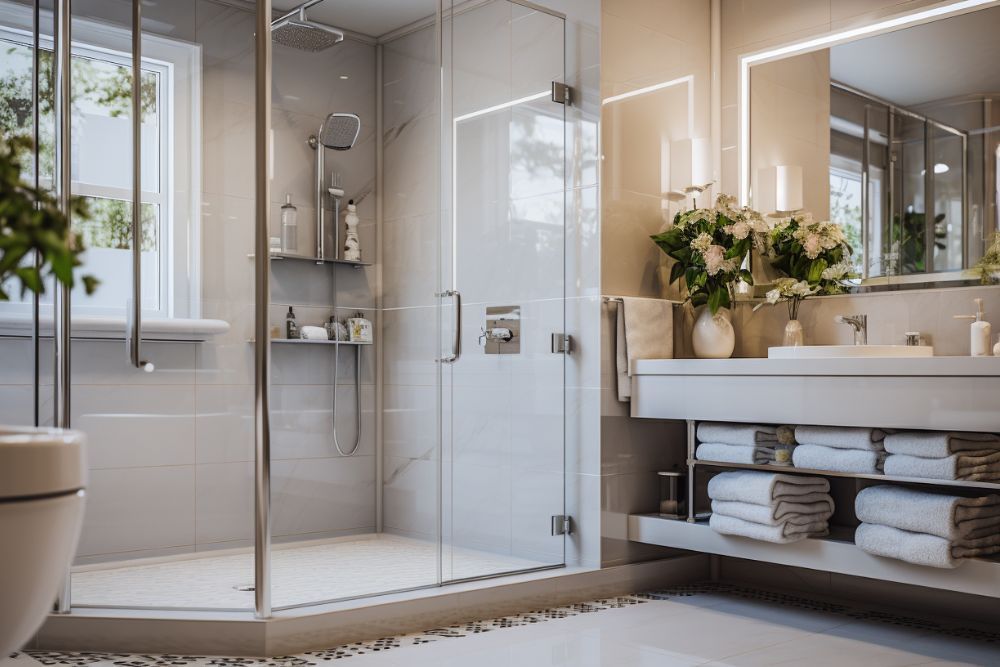5 Unexpected Benefits of Installing a New Tub or Shower

Did you know that there are many benefits of installing a new tub or shower in your home? These days, showers and bathtubs are no longer just functional; they’re also aesthetically pleasing. From giving your bathroom a new look to increasing the resale value of your home, there are many hidden benefits of installing a new tub or shower. Let’s discuss the various benefits of remodeling your bathtub or shower space and how it could help you in the long run.
What Are the Benefits of Installing a New Tub or Shower?
Installing a new tub or shower can offer many unexpected benefits. The first is the potential to free up space in the bathroom by converting a tub into a shower. This can be a practical and cost-effective solution for those with limited bathroom space. Another benefit of installing a shower is that it can reduce water consumption due to the availability of water-saving showerheads. As most Americans prefer showers over baths, installing one will make your bathroom more functional and provide greater flexibility when it comes to bathing. Lastly, showering uses less water than bathing, which can also help you save on water bills. All these benefits make investing in a new tub or shower an attractive option!
Easier Cleaning and Maintenance
Replacing an old bathtub with a new shower is a great way to modernize your bathroom and add value to your home. Not only is it aesthetically pleasing, but it also comes with many unexpected benefits. For one, the new shower requires less cleaning and maintenance than an old bathtub as it is designed with easier-to-clean materials and is less likely to cause moisture damage. Moreover, taking a shower instead of a bath can save water, as showers use 10-25 gallons of water compared to 50 gallons for a bath. Installing a new shower also does not have to break the bank – you can get a free consultation and estimate before beginning the project. Finally, by investing in a contemporary showerhead, you can conserve even more water and reduce your monthly water bills!
Increased Home Value
Installing a new tub or shower can be beneficial in more ways than one. Not only will it give your bathroom an updated look and feel, but it can also increase the resale value of your home. According to a 2017 survey by the American Institute of Architects, large walk-in showers are particularly popular among homebuyers. Upscale showers, stall showers without a tub, and doorless showers are all in-demand features for potential homebuyers. Universal design showers can also be beneficial, as they offer increased accessibility for people with disabilities. Homeowners typically recoup more than half of the cost of the remodel when installing new bathtubs or showers, making it a great investment for anyone looking to remodel their bathroom and increase the value of their home.
Different types of tubs and showers
The bathtub or shower is a central feature in any bathroom. Installing a new tub or shower can come with various advantages. Not only do you get to enjoy the added luxury of bathing, but there are also some unexpected benefits that come along with it. From the different types of tubs and showers available, such as standard, claw-foot, freestanding, soaking, whirlpool, and walk-in varieties, to the materials used to build them such as acrylic and enamel-coated cast iron, you have plenty of options to choose from. Furthermore, showers can come as stalls enclosed with doors or curtains and walk-in showers without doors or curtains while whirlpool tubs feature built-in jets that release massaging blasts of water into the tub. You can also equip your shower with rainfall or waterfall shower heads that releases water soothingly. Installing a new tub or shower will not just add luxury to your bathroom but many other benefits as well!
What to consider before installing a new tub or shower
Installing a new bathtub or shower in your bathroom can be an exciting remodeling project. But before plunging into the remodeling process, it is important to consider some factors that may affect the success of the renovation. First, consider the current condition of your bathroom, including the plumbing, shower valve, subfloor, and framing. This will help you determine if installing a new tub or shower is feasible for your bathroom space and budget. Additionally, understand your family’s needs and determine if a bathtub or shower would better fit your lifestyle. Take advantage of free consultations offered by professional contractors to discuss the details of the remodeling project and estimated costs. Finally, research different styles and options for your new tub or shower to determine which one fits your design preferences.
What are the best materials for your new tub or shower?
Installing a new tub or shower in the bathroom can have many unexpected benefits. Not only will it add a fresh look to your bathroom, but it can also increase the property value of your home. But, choosing the right materials for your new tub or shower is key. A tile is a popular option, as it’s durable and comes in a variety of colors and designs. Glass panels can also give your bathroom a modern touch. LuxStone™ composite wall panels are a great option too, as they’re low-maintenance, waterproof, and mold-resistant. Acrylic and fiberglass are also popular materials for tubs and showers. Consider walk-in tubs or shower wall panels for long-lasting benefits that will make bath time much more enjoyable!
Conclusion
There are plenty of reasons to upgrade your tub or shower. But the biggest benefit is that it can improve the look and functionality of your bathroom while giving you more space to relax or get ready for the day. A new shower or bathtub can also boost the resale value of your home and make it a more pleasant place to shower or bath. Installing a new bathtub or shower is an investment that will pay off in the long run. Besides, you’ll have a new place to take those much-needed bubble baths. If you’re looking for guidance on installing a new bathtub or shower in your home, get in touch with us today.




